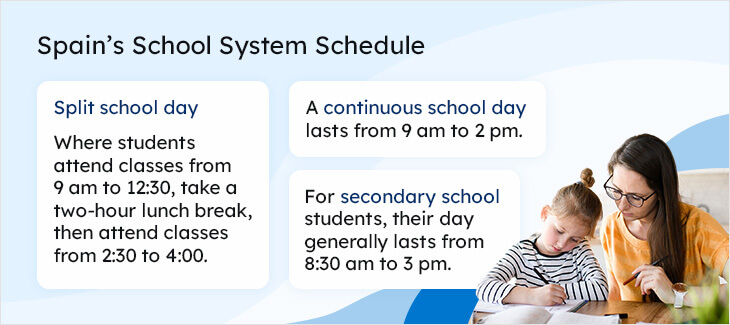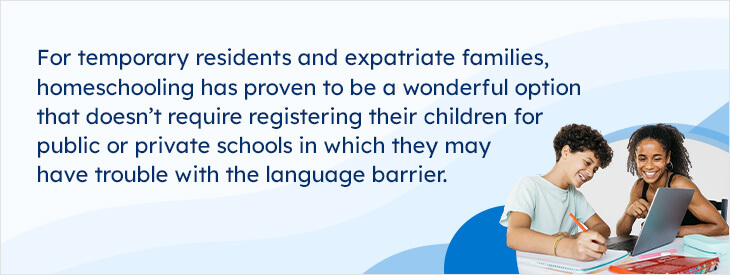Just like any other type of schooling, homeschooling is an international endeavor. Millions of families around the world have made the decision to take their child’s education into their own hands, especially during and in the wake of COVID-19. And, like the United States, every country has its own opinions, philosophies, and laws surrounding homeschooling.
In this monthly series, we’ll take a look at different countries around the world and how they view homeschooling as well as the types of laws (if any) those countries have to govern homeschooling. The first country we visited was the second-largest country in the world, and the northern neighbor to the United States–Canada. Then we went island hopping to the Philippines and Puerto Rico before cruising on over to South Africa. We headed back to the Caribbean to the Dominican Republic, traveled all the way to Thailand, made our way back to Mexico, and then journeyed to the Middle East to explore homeschooling in Qatar and Saudi Arabia! Now we’ll move to Europe, where we’ll examine homeschooling in Spain!
Spain is full of interesting facts, some of which many people are unaware:
- It is the second-largest country in the European Union, behind only France.
- With approximately 47.5 million residents, Spain ranks #32 in the world.
- Most residents of Spain live in urban areas, the largest being Madrid (more than 6.7 million people) and Barcelona (more than 5.6 million). Other cities/metropolitan areas with a population of around 1 million or more are Seville, Malaga, Bilbao, and Valencia.
- Spain is actually a monarchy, ruled by King Felipe VI.
- According to an OECD report from 2013, the average Spaniard devotes 16 out of 24 hours every day to leisure, including eating, drinking, and sleeping.
- The average life expectancy in Spain is approximately 82 years, making it one of the highest in the world.
- Spain was the first country in the world to have wind as its primary source of electricity.
- According to the Guinness Book of World Records, Madrid is home to the world’s oldest restaurant. Restaurante Botín has been serving Spaniards since 1725!
- With nearly 84 million visitors, Spain ranks as the second-most-popular tourist destination in the world–only France welcomed more tourists.
- Spain is considered a birthplace of fine arts. Not only did the country produce such world-renowned artists as Diego Velazquez, El Greco, Joan Miro, Pablo Picasso, and Salvador Dali, but it was also home to Miguel de Cervantes, author of Don Quixote, a founding work of Western literature written in 1605.
Rules and Requirements for Homeschooling in Spain
Homeschooling in Spain can be…tricky. While it’s not technically considered illegal by the Spanish government, it certainly is not looked upon fondly. The legal precedent states that, while it may not be illegal, it “could be considered illicit under certain circumstances because it is not recognized by the constitutional system of Spain.” According to the Home School Legal Defense Association (HSLDA), there are approximately 2,000 homeschooling families in Spain, which is not a very high number considering the population is closer to 50 million.
Because it’s neither encouraged nor truly recognized by the government, homeschooling can prove to be a difficult path to education for families who are not interested in enrolling with Spanish schools. There’s no real established process for homeschooling in the country, and families who ultimately do pursue homeschooling leave themselves open to potential legal action–which generally only includes having to enroll their children in a Spanish school. Plus, the Spanish legal requirement to formally educate all children between the ages of 6 and 16 only applies to permanent residents–not those who have not yet received permanent residency or are only in the country for a limited amount of time. Therefore, those families should be able to homeschool without concern.
That said, homeschoolers are a determined bunch! Despite its murky legal status in the country, there are homeschooling groups and resources to be found in Spain. These groups and websites can help provide support, answer your questions, and assist you along the way.
- Kids in Madrid
- Kids in Madrid Facebook Page
- Homeschooling en Madrid
- Laura Mascaro
- Educacion Libre
- Educar En Familia
Similar to some of the other countries we’ve covered here, Spain offers plenty in the way of educational sites and attractions that are perfect for homeschool field trips and exploration. In fact, Spain is home to 49 sites on the UNESCO World Heritage List, which is the fourth-most in the world! With such a wide array of cultural and natural wonders to visit, plus a plethora of museums, galleries, and other sites, Spain is a wonderful country in which to learn outside the classroom.
Spain’s School System
As we mentioned above, school in Spain is mandatory for children ages 6 to 16. Primary Education (Education Primaria) is for those aged 6 to 12. Once children have completed their Primary Education, they move on to Compulsory Secondary Education (Educacion Secundaria Obligatoria), which covers students ages 12 to 16. Three types of schools comprise Spain’s education system: state-funded, private-subsidized, and private.
Most Spanish families opt to send their children to state public schools, of which there are nearly 14,000 throughout the country. State primary schools average around 21 students per classroom (25 for secondary schools), and tuition is free. Additionally, there are approximately 3,000 colegios concertados in Spain, most of which are Catholic schools that offer a religious education at a more affordable cost than private schools.
The typical primary school day in Spain is not unlike one in America. Some schools offer a split school day, where students attend classes from 9 am to 12:30, take a two-hour lunch break (at school or at home), then commence classes from 2:30 to 4:00. A continuous school day lasts from 9 am to 2 pm with a normal lunch break provided. For secondary school students, their day generally lasts from 8:30 am to 3 pm.
Primary and secondary school subjects covered include Spanish language and literature, math, natural and social sciences, and a foreign language. Students also participate in physical education and other elective subjects.
Globally, Spain ranked #17 out of 87 countries in U.S. News & World Report’s 2023 Best Countries for Education, a quite impressive ranking. Compared with the Organization for Economic Co-operation and Development’s (OECD) Education GPS, which uses the Programme for International Student Assessment (PISA) to assess the reading, science, and math skills of 15-year-old students every three years, Spain stacked up pretty closely to the global OECD averages in math and science (reading scores are not available):
- In math, students in Spain scored 473, which is just above the OECD country mean (472).
- In science, students in Spain scored 485 points, the same as the OECD country mean.
- In reading, Spanish students were slightly below the 476 average with a score of 474.
Students in Spain appear to enjoy their lives, more so than students in many other OECD countries. Only 17% of students in Spain reported being bullied at least a few times per month, which is below the 22% average. Additionally, Spanish students show more kindness to others–92% of students said it’s a good thing to help others who can’t defend themselves (higher than the 88% OECD average). Nearly three-quarters (74%) of students in Spain reported that they’re satisfied with their lives, a significant seven points higher than the 67% OECD average. And 96% of Spanish students say they’re sometimes or always feeling happy, which ranked first overall.
So, why homeschool in Spain? Considering that the government does not formally recognize homeschooling as a true form of education, most citizens of Spain enroll their children in either the state-funded, private-subsidized, or private schools offered throughout the country. However, for temporary residents and expatriate families, homeschooling has proven to be a wonderful option that doesn’t require registering their children for public or private schools in which they may have trouble with the language barrier.
Bridgeway in Spain
Bridgeway Academy is ready to be the homeschool partner for students and families in Spain. We are already the homeschool choice for many students in the Spain! And just like we did for those students, Bridgeway can help your family choose the right program to fit your schedule and needs. We offer pre-k and kindergarten homeschool programs, elementary homeschool programs, middle school homeschool programs, and high school homeschool programs.
If you’re currently living in Spain or are planning on moving there, remember that Bridgeway offers plenty of amazing homeschool programs as well as curriculum for homeschooling. We also offer accreditation, record-keeping, and support–that can be used anywhere in the world! And, don’t forget to look up fellow Bridgeway families–it’s a community that can be found in nearly two dozen countries across the globe, and the Bridgeway community is a strong one. Download our free PDF about homeschooling with a U.S. based program and then contact our admissions team today at (800) 863-1474 to start your homeschool adventure. Stay tuned–we’ll be bringing you homeschooling info from another international location soon!










